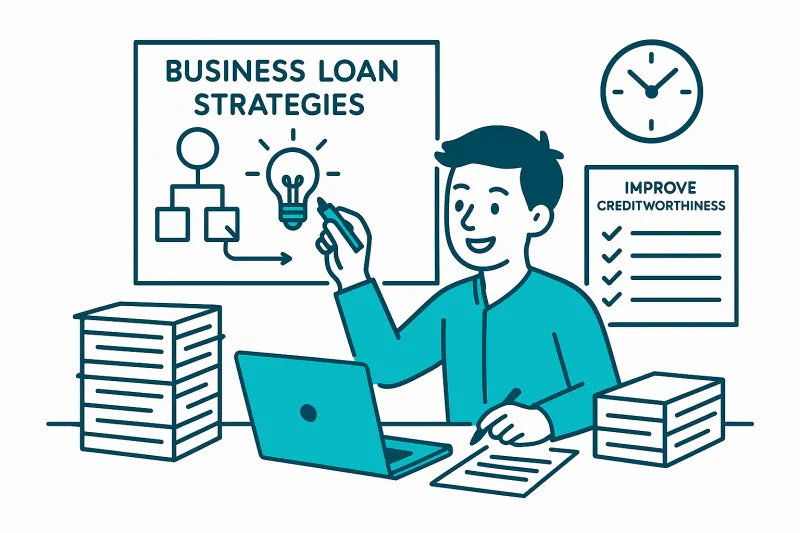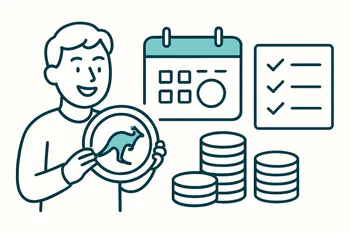How to Get a Business Loan with Bad Credit
- Personal Finance
- 04 Mins read

Understanding Bad Credit
Having bad credit can feel like a heavy weight when you're trying to secure a business loan. Bad credit typically means a low credit score, often due to missed payments, defaults, or high credit utilization. In Australia, a score below 580 is generally considered poor. But don’t lose hope! Many have walked this path before, and there are ways to navigate these challenges.
The Importance of Credit Scores
Your credit score is a number that summarizes your credit history. Banks and lenders use it to assess your likelihood of repaying a loan. Factors affecting your score include:
- Payment History: Consistent late payments can drop your score significantly.
- Credit Utilization Ratio: This is the total credit you’re using compared to your total credit limit. High utilization suggests financial strain.
- Length of Credit History: A longer, responsible credit history generally boosts your score.
- Types of Credit: A mix of credit cards, loans, and other financing can help improve your score.
Understanding these factors is key to improving your score and your chances of getting a loan.
Steps to Improve Your Chances of Getting a Business Loan
1. Know Your Credit Score
Start by obtaining your free credit report through services like Equifax or Illion. Look for any inaccuracies, as even a small error can hurt your score. If you find mistakes, dispute them to improve your standing.
2. Develop a Strong Business Plan
Most lenders want to see a solid business plan, especially if you have bad credit. A clear plan outlines how you intend to use the loan funds and how you will repay them. Key elements include:
- Executive Summary: A brief overview of your business.
- Market Analysis: A look at your industry and competitors.
- Marketing Strategies: How you plan to attract customers.
- Financial Projections: Expected revenues and expenses for the next few years.
A well-prepared business plan showcases your commitment and can build lender confidence, even if your credit isn’t ideal.
3. Explore Alternative Lenders
Traditional banks often shy away from lending to those with bad credit. However, alternative lenders, like online companies or peer-to-peer platforms, may be more flexible. They often consider factors beyond your credit score, such as:
- Business cash flow
- Time in business
- Sales revenue
Pros and Cons of Alternative Lenders
Pros:
- Easier approvals
- Faster processing times
Cons:
- Higher interest rates
- Less favorable terms
Make sure to read the fine print! Understanding the terms of repayment can save you from future headaches.
Consider Secured Loans
A secured loan requires collateral, like equipment or inventory. Offering an asset reduces the lender's risk, making it easier to get approved despite poor credit. The key is to be confident that you can repay the loan to avoid losing your collateral.
Use a Co-signer
Finding someone with good credit to co-sign your loan may significantly improve your odds. This person takes responsibility for the loan if you default, reducing the lender's risk. Just remember, your co-signer must trust that you will make the payments.
4. Improve Your Business’s Financial Health
Lenders will scrutinize your business's finances closely. Work on boosting your cash flow:
- Increase Revenue: Identify new sales strategies or expand your market.
- Cut Costs: Review your expenses. Eliminating unnecessary costs can improve your bottom line.
Case Study: Rebuilding from the Ground Up
Take the example of "Jane," who owns a small cafe. After months of struggling with debt and poor credit, she decided to:
- Streamline her menu, cutting items that didn’t sell well.
- Negotiate better deals with suppliers to lower costs.
Within six months, her credit score improved along with her cash flow. Jane’s persistence allowed her to secure a small business loan to expand her cafe.
5. Establish a Relationship with Lenders
Building relationships with potential lenders can work in your favor. Attend local business events, workshops, or networking meetings. This gives you a chance to make a positive impression and explains your unique business situation personally.
Prepare Your Documentation
Have all necessary documentation ready:
- Business tax returns
- Financial statements (profit and loss, cash flow)
- Personal tax returns (if you’re a sole trader)
- Any contracts with clients or vendors
Providing comprehensive documentation not only demonstrates your professionalism but also shows you’re serious about your business.
6. Be Honest About Your Credit Situation
Lenders appreciate transparency. If you have a low credit score, explain the reasons behind it and how you’ve made strides to correct it. Perhaps you’ve had a rough patch, like unexpected medical expenses, but you’re taking steps to move forward.
7. Shop Around for the Best Terms
Don’t settle for the first loan offer. Shop around to see who’s willing to work with you. Different lenders offer varying rates and terms. Consider:
- Interest rates: Even a small difference can total a large amount over time.
- Loan fees: Look for hidden fees that might hike up the cost.
- Flexibility in repayment: Some lenders offer more lenient repayment schedules.
Key Takeaways
- Bad credit doesn’t have to stop you from getting a business loan.
- Improve your credit score beforehand, if possible.
- Develop a comprehensive business plan to present to lenders.
- Explore alternative lenders or consider secured loans for better chances.
- Building relationships with lenders can be beneficial.
Remember, resilience and preparedness can make a significant difference in your financing journey.
Wrapping It Up
Facing bad credit is undoubtedly challenging, but it’s not the end of the road for aspiring business owners. With the right strategies and a proactive approach, you can secure the financing you need to grow and succeed. Utilize your resources, stay informed, and most importantly, don’t give up.
“Success is not final; failure is not fatal: It is the courage to continue that counts.” – Winston Churchill
In the world of business, persistence is key. Your path may not be traditional, but with determination and the steps outlined above, you can unlock doors to funding opportunities—even when the odds seem stacked against you.



